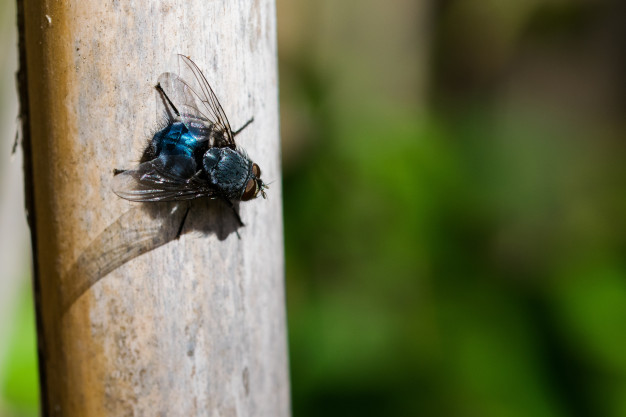Flies Treatment
Flies have been a nuisance insect for thousands of years. They affect human welfare because they can transmit diseases. Flies such as the common housefly are classified as filth flies because they breed in rotten food, manure, and garbage. A fly can mature from egg to adult in as few as ten days. This quick maturity can cause a severe fly problem in a short time. Proper sanitation and exclusion get rid of flies for long term results.
Use insecticides to kill an existing fly population. The insecticides come in residual forms, aerosols, fogging materials, and baits. Fly Lights with distinctive UV spectrums are also well known for attracting flies and trapping them. Fly lights are most popular in commercial establishments because they work well. We also carry fly glue traps.
An effective fly control program begins with sanitation and exclusion management. After sanitation and exclusion, we carry a wide assortment of insecticides that come in residual forms, aerosols, fogging materials, and baiting forms. Fly Lights with distinctive UV spectrums attract flies and traps them. These are popular in commercial establishments. We also carry fly glue traps.
Sanitation & Fly Control
Sanitation is critical in a good fly management program. The goal of sanitation is to remove or prevent any medium where fly larvae will develop. It's also important to remove things that are attractive to adult flies, such as garbage and animal waste. Moisture is a critical factor in any fly breeding material. Good drainage is also important, where possible.
- Keep garbage cans and dumpsters clean. Invade Bio Foam is an all-natural product, a probiotic used to spray on the leftover organic debris in dumpsters. Soldier Fly larvae are commonly found around dumpsters and garbage cans. Keep tight lids on the garbage cans. Flies are attracted to odors. Keep garbage cans as far away from doors as possible to keep them from moving into the structure.
- Repair window screens and doors. Use mesh screens on openings in the building. Where doors must be kept open for customers, trucks, etc., outfit the doors with air curtains. Air curtains can prevent fly entry if the velocity is 1,600 feet per minute or higher.
- In-home kitchens, restaurants, and commercial kitchens, drain flies can become a problem. An excellent product to treat home drains and restaurant drains is Invade Bio Treatment Gel. With microbes, this all-natural product eats the leftover scum in the drains.
- Dead rodents and birds can increase a fly problem. Remove the carcasses, because flies lay eggs on decomposing rodents and fowl. The eggs become maggots (larvae), and the maggots become adult flies.
- Do not overwater indoor potted plants. The soaked soil will provide a perfect breeding area for gnats. Keep the pots well-drained.
- Keep outdoor areas cleaned. Clean away any soiled bedding, decaying plant, straw animal matter.
General House Fly Control Management
There are various options for fly control management. These options include liquid concentrates, insecticide dusts, pyrethrin aerosols, fly light traps, fogging materials, fly baits, and outside fly traps.
Filth Flies
such as the house fly can be nuisance pests but may be potentially harmful to humans and animals. The habits of filth flies favor the spread of bacteria and other disease-causing organisms. Filth flies not only feed and lay eggs on garbage, manure, and carrion. They may contaminate human foods and food prep areas when landing on these areas. House flies, for example, can spread diseases such as food poisoning and dysentery.
- House Fly
- Blow Fly
- Bottle Fly
- Soldier Fly
- Flesh Fly
Small Flies
Many small flies(1/4") are found in food prep areas and may carry disease-causing organisms.The six fly species listed below are the most common of small flies.
- Fruit Fly
- Phorid Fly
- Moth Fly
- Sphaerocerid Fly
- Fungus Gnats
- Cheese Skippers
Nuisance and Biting Flies
Many commonly found flies found around the home are a nuisance and or bite. As with many flies, these flies breed on decaying organic matter and animal wastes. They may transmit bacteria and viruses to humans. Flies such as stable flies or horse flies (sometimes called "biting flies") feed on mammalian blood and can give a painful bite.
- Cluster Fly
- Face Fly
- Stable Fly
- SMosquitoes
